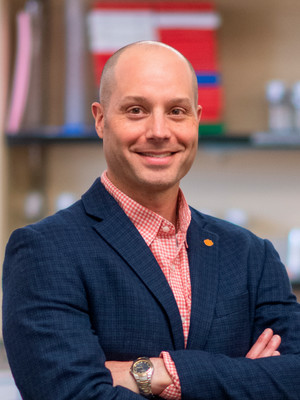


Dr. John Witherspoon Gilpin ’82, a philanthropist and leader in providing for students and institutions in medicine and higher education, recently established an endowed associate professorship in bioengineering. Dr. Jeremy Mercuri is the inaugural holder of the professorship. Ed.
It is a privilege to be named the John Witherspoon Gilpin, M.D., Endowed Associate Professor of Bioengineering. This honor supports Clemson’s journey to preeminence in medical technology innovation and in educating future generations of medical technology professionals. As the industry evolves in areas of digital health, wearable technology, and regenerative medicine, so do our research and educational foci. Part of my vision for this professorship is to strengthen the growth of our relationships with clinical collaborators within the State of South Carolina and beyond. As Gilpin Endowed Associate Professor, I will contribute to this effort by attending academic division leader meetings and semi-annual research meetings with Prisma Health clinicians. This will facilitate the development of additional collaborations among BIOE faculty and clinicians while ensuring our research will have a positive impact on patient care in the near term.
Prominent medical technology companies currently trend toward expanding product portfolios through acquisitions and outsourced product development. I view this as an excellent time to further foster industry-academic partnerships. Our BIOE faculty are experts and broadly experienced at creating new technologies, starting companies and performing innovative applied research: We are poised to supply knowledge and direction for startups and mergers, thereby seizing an opportunity to showcase Clemson BIOE. The Gilpin professorship will enable me to facilitate the development of such industry-academic partnerships by attending medical device industry-focused conferences, reaching out directly to industry contacts and alumni and serving as a liaison between industry and Clemson faculty. Building such relationships will benefit our department and contribute to the strategic plan by enhancing extramural funding. In addition, these relationships will contribute to the sustainability of the multiple NIH COBRE cores and other world-class research facilities on our campuses.
I am certain that building industry relationships will ensure that the education we provide our BIOE students continues to be relevant and evolve with industry trends, emerging regulatory paradigms, and customer needs. In this professorship, it is my goal to continue the expansion of our M. Eng program, which focuses on preparing graduate students for success in the medical device industry. We will look to partner with the Clemson and MUSC technology transfer offices to assist in further developing and vetting promising new technologies and medical device designs born in our research labs and clinical partnerships. For our curriculum as a whole, our shared leadership with Clemson-MUSC faculty and partnership with experienced medical device innovators, we will continue to evaluate course offerings and specializations to train students via experiential learning opportunities in relevant topics. These will include medical device product development and commercialization, regulatory affairs, entrepreneurship, and clinical trial design and management.
Finally, taking on this role will afford me and my lab additional opportunities to engage with clinicians and academic collaborators to advance research at our CUBEInC facilities aimed at combating musculoskeletal injury and disease. I am very humbled and blessed to have this unique opportunity.